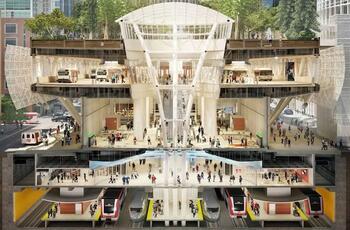
Is there any transit construction project that is so expensive that a transit agency will say, “Let’s not do this”? The Antiplanner has argued that the answer is “no”; instead, the only question agencies ask is, “Where are we going to get the money to do this?” Evidence for this view has recently come to light in San Francisco and Baltimore.
Last January, I observed that the price of a 1.3-mile commuter-rail extension that San Francisco was planning had increased from $5.0 billion to $6.7 billion, or more than $5 billion a mile. I pointed out that there were several viable alternatives to spending what would be a record amount of money per mile on a transit project, including replacing the trains with buses or terminating the trains at a different location just seven minutes away. Now comes the news that the cost of the project has increased again to $8.25 billion, or more than $6.3 billion a mile.
The terminal and $8.25 billion tunnel to it are supposed to host both commuter trains and California’s high-speed trains. But those trains won’t be going at high speeds in the tunnel as sharp corners will prohibit any speeds much above bus speeds on the surface. Yet, to satisfy someone’s ego, San Francisco believes it has to have the trains reach the planned station.
At the other end of the country, rail contractors are salivating at the prospect of building a new light-rail route in Baltimore called the Red Line. Never mind that transit ridership declined after construction of existing light-rail lines. Ridership isn’t the goal; spending money is.
Transit advocates are undaunted by the increase in the cost of Maryland’s Purple Line, outside of Washington DC, from $2 billion to more than $9 billion. In fact, that is seen as a plus. In a beautiful demonstration of transit entitlement, a recent editorial in the Baltimore Sun observes that, after wasting so much money in southern Maryland, Baltimore deserves to have its own wasteful project.
Read the rest of this piece at The Antiplanner.
Randal O'Toole, the Antiplanner, is a policy analyst with nearly 50 years of experience reviewing transportation and land-use plans and the author of The Best-Laid Plans: How Government Planning Harms Your Quality of Life, Your Pocketbook, and Your Future.
Photo: Architect’s model of the planned San Francisco transit center. Note the bottom level has commuter trains on the outer tracks and high-speed trains on the center tracks even though the prospects of high-speed rail ever reaching San Francisco are dimming every day. Courtesy Antiplanner.












